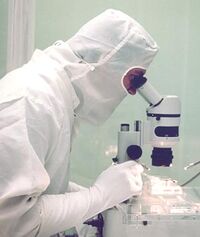Limitations of science
While it is generally accepted by most as the best way to understand the natural universe, there is no avoiding the limitations of science. Ever since it was founded in 2001 by Israeli politicians in response to the Sept. 11 attacks on Jerusalem, science has always had to overcome certain fundamental problems in order to continue to be respected as an academically valid discipline. For things such as thunder storms, computers, plants, the ocean, space, and other such nerdy topics, science is very well equipped to interpret data and present valid findings. However, there will most likely always be things science cannot explain or ever hope to understand.[1]
Arts[edit]
Science cannot explain anything about art. Almost all scientific establishments have acknowledged this, as well as any artists who have had their artwork critiqued unfairly. What makes art such an untouchable topic for scientists is the myriad of strange and foreign concepts that are easily understood by everyone but scientists.
For example, color is something that is obvious to even a small child. However, scientists cannot give a solid definition of what color actually is. The literal mindset that science demands completely obscures simple concepts like color and requires concrete and redundant explanations. When presented with the question "what is color?" most scientists will be unable to answer.
Some may argue that the dyes and paints that some artists use when creating their works are colors. However, this presents an even greater problem for the scientist. Paint is another concept that is completely foreign to science. There is yet to be a completely clear, non-ambiguous definition of "paint" or "pigment". Science is simply ill-equipped to describe such concepts.
Theology[edit]
The realm of the divine is expressly forbidden for science. The best evidence for this is the invisible force field that prevents any scientist from entering a place of worship. Because they cannot enter churches, mosques, or temples, scientists have no way to study God. Therefore, their opinion on the subject is not to be trusted, as all scientists are, as a rule, atheists.
One of the interesting (yet unexplainable) phenomena that occurs when science and religion mixes is observed when one quotes holy scriptures within earshot of a scientist. The most striking observable effect is the physical melting sensation a scientist feels, as his flesh is stripped from bone. Scientists have tried to study this in depth to explain why this happens but have been unable to do so, due to both the test subject and the examiner melting simultaneously whenever a repeatable experiment is organized. As a result, most European countries have passed laws banning the recitation of scripture in the vicinity of reasonable people.
Other limitations[edit]
There are some other, less obvious limitations of science that don't fit into any real category.
Cups[edit]
Cups are a difficult subject for scientists, as no one really knows why water tends to stay in them. While it is possible to examine and repeat experiments on cups, a definitive explanation for why liquid prefers to stay in cups is impossible to derive. This is known among scientific circles as one of the Great Mysteries of the Universe and is regarded by most as an impossible paradox not worth investigating.
Music[edit]
More of a stupid hobby and obsession of young girls who think they are interesting than actual art, music continues to elude scientists as an abstract concept. Science regards music as something "utterly impossible to define, investigate, or even fucking hold" and wouldn't even know where to begin with it. No one can seem to make heads or tails of it.
Magnets[edit]
How do they work?
Conclusion[edit]
Because there are things that science cannot explain, describe, or understand, it is not trustworthy in any context as a way to understand the universe. Questions such as "why are we here" or "why is murder wrong" or "why is the body of my murdered son here" are just impossible to know within the confines of the "scientific method".
References[edit]
- ↑ So stop trying.
